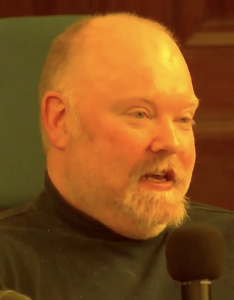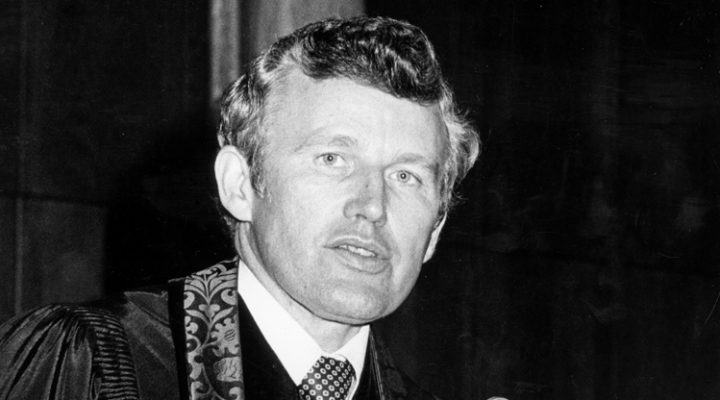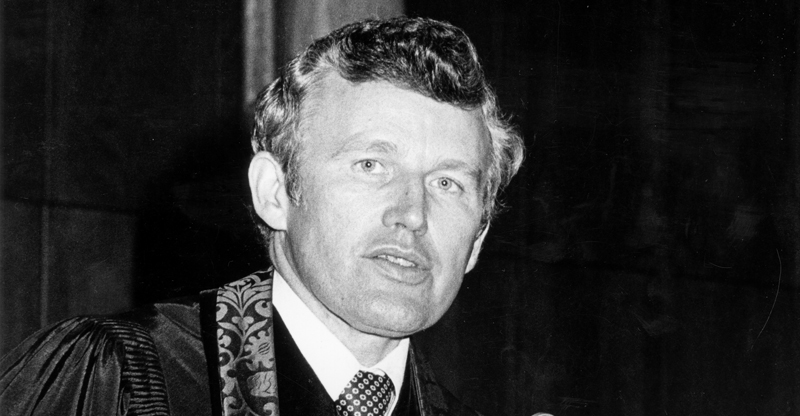This past weekend, Crescent Hill Baptist Church in Louisville, Ky., hosted “Glad Reunion: Celebrating the Ministry and Legacy of John R. Claypool.” Claypool had famously served the church as pastor throughout the turbulent 1960s and became a renowned pulpiteer in the process.
The event was formatted around the new book Claypool, edited by Doug Weaver and Aaron Weaver. Claypool’s son, Rowan, had asked me to moderate a session months ago, and I gladly accepted his invitation to the reunion.
There is a chapter in the book on Claypool’s final professional post as professor at McAfee School of Theology co-authored by his colleague Loyd Allen and student Julie Whidden Long. Julie could not attend the event and in her stead, I was asked to reflect on what it was like to be his student. While I was a poor substitute for my classmate, I was honored to attempt to encapsulate my beloved mentor.
Claypool was employed by McAfee from 2001 to 2005, which happened to coincide with the years I attended. This “coincidence” is one of God’s great blessings to me.
“My experience of Claypool was ordinary only in the sense that it represents how ordinarily ordinary encounters with John Claypool were extraordinary.”
My experience of Claypool was ordinary only in the sense that it represents how ordinarily ordinary encounters with John Claypool were extraordinary. The pastoral mantle he had carried throughout his career was well worn in his role as professor at McAfee.
My classmates’ stories are all different and yet all the same. For David Weatherspoon, Claypool was there while he was enduring the double devastation of a divorce and losing his father to a terminal illness. For Jody Long, Claypool was by his side as his father battled cancer. For me, I had lost the girl of my dreams whom I had planned to marry.

Chandler Vinson
Seminary is a difficult process for many reasons. Although I realize many find the notion archaic, I feel seminarians are on the front lines of spiritual warfare. Attempts are made to eliminate prospective pastors from the game before they find solid footing. While Claypool could not remove our trials, he ensured we were not facing them alone. And that we knew that.
I met Claypool at one of my lowest moments. As I prayed, something within me urged me to call him. I never had really met him. In response to this unsolicited cold call, he agreed to take me to eat anywhere I liked and stay as long as I felt necessary. Upon meeting him, he quickly summed me up. Before barely greeting me, he instructed me to accept grace.
I immediately thought it was a pompous, presumptuous thing to say to someone he had just met. Somewhere deep within my soul, I also knew he was correct. My problem was not the loss of the girl. My problem was perfectionism. He recognized that particular plague; he knew it all too well firsthand. Claypool would be my friend for the remainder of his life and guide me for the remainder of mine.
“God loves each of us as if there were only one of us.”
Claypool embodied one of his favorite Augustine quotes, “God loves each of us as if there were only one of us.” When you were around John Claypool, you experienced how it felt to be the sole sheep Jesus was carrying amid the flock.
At McAfee, Claypool served as a preaching professor. I had grown up in East Tennessee and had three pastors, all of whom held doctorates. I honestly don’t think I had ever heard a bad sermon before enrolling. (After being a pastor for years in Appalachia, I can assure you that is no longer the case.) I am grateful for my early pastors’ spiritual direction. But while I never had heard a bad preacher, when I met Claypool I realized I never had heard a consistently great one either.
His classes were structured similar to the medical field: I do one, we do one, you do one. Claypool would give us his take on a familiar passage, and we had the unenviable task of following him.
There is a skateboarding great named Rodney Mullen who revolutionized his sport in the 1980s. He was located in Florida while most of his peers were located on the West Coast. He would practice arduously to perfect new tricks and record them before sending them to the center of the movement in California.
While inventing new groundbreaking techniques is special, what is more special is why he sent the footage. He did not do it for acclaim or even to teach the new tricks. He did it to demonstrate the trick could be done. His hope was that people would take his work and expand upon it, not mirror it precisely.
“All good things originate with God; you and I are just passing around the biscuits.”
This was Claypool. When asked about the need to cite him when using his ideas, his response was, “All good things originate with God; you and I are just passing around the biscuits.”
Claypool’s classes were different. Unless you passed away before completion of the course, you probably were going to receive an A for your efforts, and even then I think he would have found a way to bestow a posthumous mark of excellence. There was, however, a downside to this practice. At an upstart school like McAfee there was a concern: grade inflation.
Loyd Allen touched on something incredibly significant when describing this era. At a faculty referendum on grade inflation, Loyd quipped, “Wow, John, I wish I had your students in my class. Not all mine are A students.” Allen, in fact, did not have the same students as Claypool. Don’t get me wrong. It was a relatively small student body and we were the same humans with the same names in the same bodies going to the same school. But we were entirely different students in Allen’s class than Claypool’s.
I love Loyd Allen. He can teach something as concrete as Baptist heritage or as fluid as spirituality and is always engaging and relevant. But I took his classes because they were required. And I wanted to make a good grade. To do so required much work. For which I am also grateful.
In contrast, Claypool’s classes were all electives. None of us had to be there. And the A was all but a given. But I worked harder for him than any professor because I greatly coveted his respect. But I think I attended for an even greater purpose.
“I wanted some of that spiritual stuff he had to rub off on me. I pray that it has.”
The second chapter of the second book of Kings relays the succession from the prophet Elijah to his protégé, Elisha. Elijah knows his transition from this world to the next is imminent and asks his successor what he would like of him. Elisha replies, “Please let a double portion of your spirit be upon me.” This is why I attended John Claypool’s classes (sometimes even ones for which I was not enrolled). I wanted some of that spiritual stuff he had to rub off on me. I pray that it has.
Rowan Claypool’s vision for the symposium was to introduce his father’s work to a new generation of preachers. Claypool spent his life bestowing grace and instilling hope. And this world needs that now more than ever and people who carry that torch.
As I write this, I pray for you readers that you will find someone as impactful to you as John Claypool has been for me. And if you have not yet found that person, I invite you not only to read the new book about John Claypool but also to read him.
Life brings with it pain. And I know of no better companion on your journey than John Claypool.
Chandler Vinson is a follower of Jesus. He also has a slightly unhealthy devotion to the Atlanta Braves, King Charles Cavalier spaniels and playing pub trivia. For those interested in such things, he holds two and a half master’s degrees, a doctorate and has served as a pastor and university professor.
Related articles:
September symposium will celebrate life and legacy of John Claypool
Influential minister John Claypool dies of cancer-related causes
The truth won’t make you comfortable, Cosby says in tribute to Claypool


